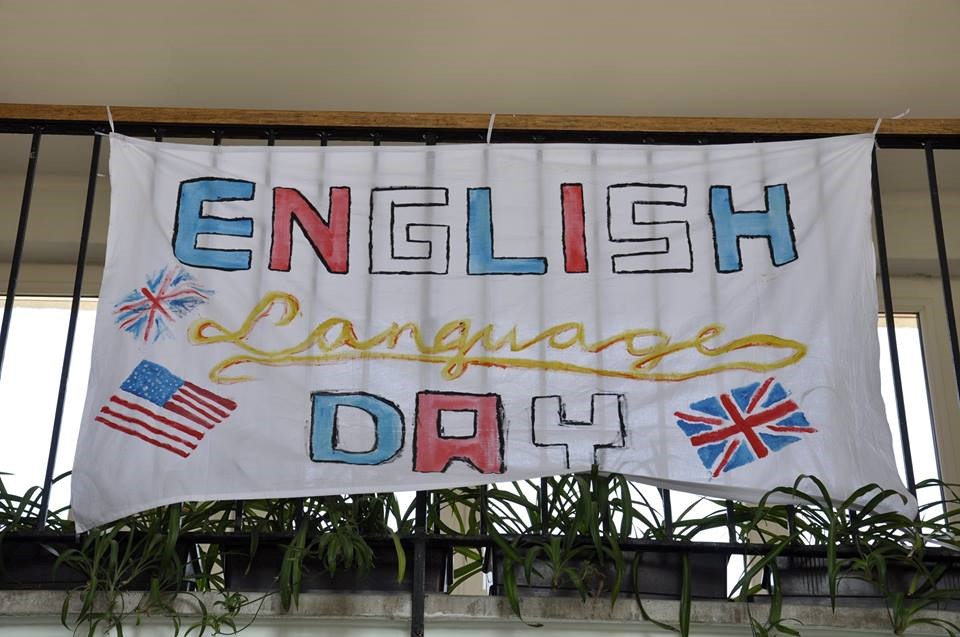
English Language Day is celebrated on 23 April
This day was chosen because it is thought to be Shakespeare's birthday, and the anniversary of his death. As well as being the most famous playwright, Shakespeare also had a huge impact on modern-day English. At the time he was writing, in the 16th and 17th centuries, the English language was going through a lot of changes and Shakespeare's creativity with language meant he contributed hundreds of new words and phrases that are still used today. For example, the words 'gossip', 'fashionable' and 'lonely' were all first used by Shakespeare. He also invented phrases like 'break the ice', 'all our yesterdays', 'faint-hearted' and 'love is blind'.
Why is learning English is so important?
English is the official language of 53 countries and spoken by around 1.5 billion people as their first or second language across the globe. It is taught in over 118 countries, making it an incredibly useful language to learn. English language learning will allow you to communicate effectively with people from all over the world, making travelling a lot easier and helping you to learn more about different cultures.
The importance of English language can be seen in almost every aspect of our lives. This is especially true in the business world where English is the most common language. English is also the language of science, mathematics, technology, tourism and countless other areas.
Reasons to learn English:
1. Simplicity is key: English has relatively simple grammar, with simpler plurals, a straightforward verb conjugation and it is mostly gender-neutral, making English language learning easier than some other languages.
2. ABC, easy as 123: The English alphabet is relatively easy to learn in comparison to other languages such as Mandarin which is in symbol form.
3. Online research: Most websites are written in English, helping you to boost your knowledge when researching for your studies and later on in life.
4. Valuable experience: Learning a new language requires a lot of time and patience. Therefore, being able to show off this impressive skill will help you stand out to employers and boost your CV.
5. Meet new people: Studying English will help you to meet interesting people from all walks of life and learn about different cultures too when you travel.
6. Language of the media industry: English is the most prevalent language used in movies and TV series around the world. By learning the English language, you’ll be able to enjoy more of the latest blockbusters!
7. And many more! Why are YOU learning English? J
Let’s get to the fun facts about English language!
v English actually originates from what is now called north west Germany and the Netherlands.
v The phrase “long time no see” is believed to be a literal translation of a Native American or Chinese phrase as it is not grammatically correct.
v “Go!” is the shortest grammatically correct sentence in English. Find out some of the longest words in the English language.
v The original name for butterfly was flutterby.
v About 4,000 words are added to the dictionary each year.
v The two most common words in English are I and you.
v 11% of the entire English language is just the letter E.
v The English language is said to be one of the happiest languages in the world – oh, and the word “happy” is used 3 times more often than the word “sad”!
v 1/4 of the world’s population speaks at least some English.
v The most common adjective used in English is “good”.
v The most commonly used noun is “time”.
v The word “set” has the highest number of definitions.
v The English language contains a lot of contronyms – words that can have contradictory meanings depending on context.
v Over 80% of the information stored on computers worldwide is in English.
v Words that are used to fill in time when speaking, such as “like” or “basically”, are called crutch words (and should best be avoided!)
v English is the official language of 67 countries.
v There are 24 different dialects of English in the US.
v The word ‘lol’ was added to the Oxford English Dictionary in 2011.
v What is known as British accent came to use in and around London around the time of the American Revolution.
v Shakespeare invented many words, such as birthplace, blushing, undress, torture and many more.
v The word “Goodbye” originally comes from an Old English phrase meaning “god be with you”.
v Etymologically, Great Britain means “great land of the tattooed”.
v There are seven ways to spell the sound ‘ee’ in English. This sentence contains all of them: “He believed Caesar could see people seizing the seas”.
v Many English words have changed their meaning over time – for example, “awful” used to mean ‘inspiring wonder’ and was a short version of “full of awe”, whereas ‘nice’ used to mean “silly”.
v The first English dictionary was written in 1755.
v The oldest English word that is still in use is “town”.
v The sentence “The quick brown fox jumps over the lazy dog.” is a pangram as it contains every letter of the language.
v The word “girl” was not initially used to refer to a specific gender. It used to mean “child” or “young person” regardless of the gender.
v ’Pneumonoultramicroscopicsilicovolcanoconiosis’ is the longest word in English. This medical term refers to a lung condition caused by inhaling ash or dust.
v The combination “ough” can be pronounced in 10 different ways. The following sentence contains them all: “A rough-coated, dough-faced, thoughtful ploughman strode through the streets of Scarborough; after falling into a slough, he coughed and hiccoughed.”